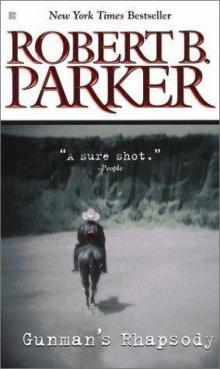Read Gunman's Rhapsody Storyline:
The Barnes Noble Review Much of Robert B. Parker's fiction – his recent Spenser novel, Potshot, is a notable example – has straddled the boundary between two traditional forms: the private-eye novel and the Western. Parker's latest, the spare, evocative Gunman's Rhapsody, represents his first attempt at a pure, unadulterated Western, moving from Boston and environs to Tombstone, Arizona and focusing on one of Spenser's true spiritual forebears: Wyatt Earp. Gunman's Rhapsody begins in 1879. Wyatt, whose exploits have already found their way into the dime novels of the period, has just arrived in Tombstone, accompanied by several of his brothers and his common-law wife, Mattie Blaylock. The Tombstone of this era is a semi-lawless boomtown located in the heart of the silver mine district. It also serves as a kind of crossroads, a meeting place for some of the iconic figures of the Old West, figures such as Johnny Ringo, Bat Masterson, Ike Clanton, Katie Elder, and the drunken, slightly demented gunfighter, Doc Holliday. A single romantic encounter dominates this rambling, almost plotless narrative: Wyatt's discovery of the love of his life: beautiful showgirl Josie Marcus, who happens to be engaged to Johnny Behan, the shady, politically connected Sheriff of Tombstone. Wyatt's affair with Josie – which takes on an obsessive, almost mythical dimension – forms the central element in an interlocking series of personal rivalries and political enmities that will culminate in the gunfight at the OK Corral, and in its bloody, extended aftermath. Parker's clean elegant style and essentially romantic sensibility prove perfectly suited to the peculiar material of this novel. Without a false note or wasted word, Parker recreates the ambiance of the West, bringing its saloons, jails, and gambling halls and its endless, wide-open vistas, to immediate, palpable life. He brings that same effortless authority to bear in describing the lives and motivations of violent, hard-edged men who live – and sometimes die – according to highly developed codes of personal behavior. The result is a fascinating historical digression that illuminates a piece of the American past while simultaneously illuminating the central concerns of Parker's large, constantly evolving body of work. (Bill Sheehan)Pages of Gunman's Rhapsody :
